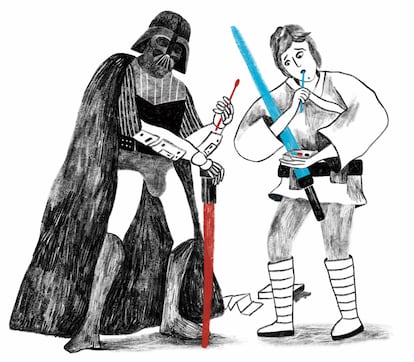Who is my father? The psychological impact of at-home DNA tests
At a time in which paternity is diffuse and expansive, science provides the ultimate certainty. But can you handle it?

The number of people who decide to analyze their DNA through at-home genetic tests is on the rise, currently exceeding 30 million. Thanks to genetics, today it is possible to reveal biological family relationships, find our true ethnic origins and expose old family secrets, such as extramarital affairs or births that were possible through a donor. But discovering that the man who raised you is not biologically related to you can trigger a storm of emotions. The estimation of paternal discrepancies, or non-paternity events (NPEs), in the general population, according to data published by the International Society of Genetic Genealogy, can be as high as one in ten people.
“In late January 2019, I spat in the plastic tube and put it back in the box,” writes Canadian novelist Kyo Maclear in her memoir Unearthing. “Not for a moment did I consider that some of the things I’d assumed basic to the story of who-I-am and where-I-come-from would be revised.” Maclear explains that three months after her father’s death, and following the advice of a friend, she bought one of those at-home DNA kits to get to the bottom of the mystery of her Irish paternal grandmother, “a woman who did not reach old age and about whose life there were very few details.” The results showed that her father had no biological link with her. “What I saw was a circle bisected into two halves. I had inherited half of each parent’s DNA — but the parental half bore no resemblance to my father’s genetic history, at least as it had been told to me.”
Never before in history has it been so easy to confirm paternity, nor to discover discrepancies, with such certainty. In 2018, the DNA NPE Friends Facebook community established a non-profit support group. At the beginning of 2023 there were approximately 8,900 people registered. A qualitative study published in 2021 by Michele Grethel and collaborators from the University of Southern California, Los Angeles (UCLA), reports the impact on the identity of 27 participants between 40 and 70 years old, with a mean age of 50 years, who discovered an unexpected paternity as a result of an at-home DNA test. None of them were indifferent, or optimistic, about the discovery.
Instead, these people revealed feelings of shock, denial, anger, fear, confusion and isolation. Their extreme emotional reactions and bodily sensations — feeling frozen, dazed, overwhelmed — were common. Many tried to track down their newly discovered relatives, describing the process as an emotional roller coaster. However, this discovery allowed them to make sense of other aspects of their lives, figuring out stories of adoptions, infidelities, sibling rivalries and hereditary genetic conditions; previously inexplicable phenomena, such as inexplicable tastes, talents, and attractions, became understandable.
The search for one’s father implies delving into identity continuity. Despite their different origins, mythological and biblical narratives highlight the ambivalent bond between a father and his children: revenge, castration, envy and murder coexist on one hand, and love, admiration and the desire to be like him on the other. The figure of the father is central in the configuration of the psyche — this I have noticed frequently with my patients, especially among those who lacked the concrete presence of one. His influence on the lives of children, and even on subsequent generations, is complex and somewhat enigmatic. It opens the door to a story full of ruptures, and any bond that is established is built on the basis of that discontinuity, where bonds are never completely free of the ghosts of the past. Maclear describes it like this: “The father I had trapped in my mind needed to be free, his spirit needed to ascend.”
According to Judith Butler, a philosopher specializing in gender studies, kinship structures tend to be on the side of normative family organization. However, we live in a time in which kinship has become fragile, porous, expansive. A time, as Butler says, in which children, due to divorce and remarriage, migration, refugee status and exile, pass from one family to another; from a family to not having a family, or from not having a family to having a family. Or, in which they live, psychically, at the crossroads of the family, or in multi-level family situations, in which they may well have more than one woman who acts as a mother, more than one man who acts as a father, or no mother or no father, with half-siblings who are also friends. Given this scenario, genetics increasingly defines, and limits, the meaning of kinship.
Sign up for our weekly newsletter to get more English-language news coverage from EL PAÍS USA Edition
Tu suscripción se está usando en otro dispositivo
¿Quieres añadir otro usuario a tu suscripción?
Si continúas leyendo en este dispositivo, no se podrá leer en el otro.
FlechaTu suscripción se está usando en otro dispositivo y solo puedes acceder a EL PAÍS desde un dispositivo a la vez.
Si quieres compartir tu cuenta, cambia tu suscripción a la modalidad Premium, así podrás añadir otro usuario. Cada uno accederá con su propia cuenta de email, lo que os permitirá personalizar vuestra experiencia en EL PAÍS.
¿Tienes una suscripción de empresa? Accede aquí para contratar más cuentas.
En el caso de no saber quién está usando tu cuenta, te recomendamos cambiar tu contraseña aquí.
Si decides continuar compartiendo tu cuenta, este mensaje se mostrará en tu dispositivo y en el de la otra persona que está usando tu cuenta de forma indefinida, afectando a tu experiencia de lectura. Puedes consultar aquí los términos y condiciones de la suscripción digital.








































